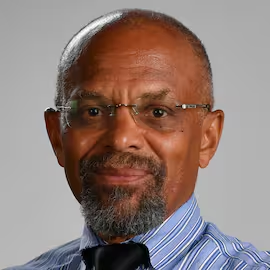
By Brandon Henry, NABJ Monitor Digital
Joe Davidson, columnist and co-founder of the National Association of Black Journalists, left The Washington Post this summer after 20 years due to a policy restricting the level of opinion and commentary in news section articles.
Davidson, who wrote the Federal Diary (renamed Federal Insider in 2016) for 17 years, cited “management interference” as a reason for his departure, along with eight other columnists who left the company within the last year.
He also said a lack of leadership contributed to low morale in the newsroom.
“Morale in the whole organization was really falling, it was really dropping quickly because of Jeff Bezos’ actions,” Davidson said.
Bezos, founder of Amazon, bought The Post in 2013.
Davidson said one of the first editorial decisions that influenced his decision to leave was Bezos blocking an editorial that would have endorsed former Vice President Kamala Harris for president.
Then, after the 2024 presidential election, Bezos not only congratulated President Donald Trump on his victory, he also attended the inauguration.
Davidson said these developments were an “unseemly way for the leader, the boss of the Washington Post, to interact with the President.”
“He’s acting like a supplicant,” Davidson said. “I mean, it’s one [thing] holding, stopping the nomination or the endorsement of Kamala Harris. Then we see him, kind of in center stage, endorsing Trump.”
Bezos’ influence within The Post did not end there. In April, Davidson wrote a column about how “you can draw a line through many of Donald Trump’s policies where the ingredient, a key ingredient, is an attack on thought, speech and belief.”
Davidson said the column was killed and he knew then his time at The Post was coming to an end. He said he is unsure if Bezos directly impacted the killing of the column, but believes it “would be naive” to ignore the context of Bezos’ interactions with Trump.
And when several top journalists began leaving last October, he said knew he wasn’t alone and did not feel comfortable.
“I hung in there as long as I could, maybe even longer than I should have, I just couldn’t hang. I just had to get out of there,” Davidson said.
Davidson said that the censorship within The Post was “part of a policy of no commentary or opinion in the news section, as opposed to the opinion section, but the policy was unannounced and it was unevenly enforced.”
“I don’t think it’s really a good management practice to have an unwritten policy. It got to the point where it was simply untenable for me to stay. I said in my resignation letter that these policies have left me, as a columnist, without a column,” Davidson said.
So, what’s next for Davidson? The co-founder said a couple of organizations have approached him about writing, but he said he would like to do more volunteer work and traveling. Some of that travel includes his annual attendance at NABJ conferences.
Davidson has been to all 49 NABJ conventions, from Texas Southern University in 1976, to the 50th anniversary conference in Cleveland this week. He said when he comes to the conventions, he gets a feeling of being part of a family that stretches across the country and, to some extent, even around the world.
“Being around all of these Black journalists is very encouraging, invigorating. It’s like a big family reunion, and it’s very productive,” Davidson said.
Djibril Diallo, president of the African Renaissance and Diaspora Network, and a friend of Davidson, said their relationship goes back so many years, it is hard to remember a time when he was out of the picture.
Diallo said that Davidson has always been more than a colleague to him, and that his commitment to African issues aren’t performative or episodic, but rooted.
“Long before it became fashionable to talk about global Blackness or pan-African solidarity in media, Joe was already doing the work,” said Diallo. “Davidson is one of those rare figures whose contributions are both foundational and ongoing.”
While Davidson has done a lot for NABJ, he mentions that he gets a great deal of joy and pride out of seeing the NABJ Student Multimedia Project cohort grow and develop.
Davidson said it’s the connections that feed him and keep him returning every year to NABJ, an organization that means so much to him.
“I’m very glad and very proud to have been a part of it, and still a part of it. For all these decades, half a century, it’s kind of hard to believe, really,” he said.




Be the first to comment